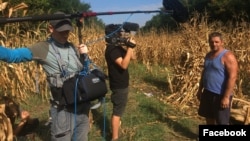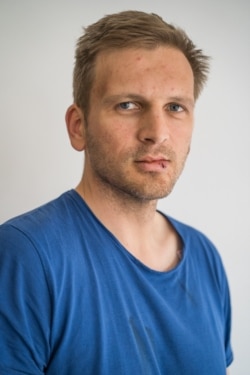Surrounded by a group of men wielding axes, Romanian filmmaker Mihai Dragolea was sure he was going to die.
The filmmaker, part of the independent Vagabond Film production company, was with his colleague Radu Mocanu as well as Tiberiu Bosutar, a former timber worker turned environmental activist, in a remote forested area in Romania last month for a documentary on illegal logging.
While the film crew was working in the woods, a group of 10 to 20 men, carrying axes and bats, approached. Dragolea said someone yelled, "Stop the camera. We're going to kill you." Another man broke their car key so they could not escape.
The men beat Dragolea, Mocanu and Bosutar and destroyed equipment in an assault that media and environmental rights analysts say shows the dangers of investigating illegal activities that harm the environment.
"Covering the environment can be incredibly dangerous, especially in places where natural resources are a major source of a country's revenue," Meaghan Parker, executive director of the Society of Environmental Journalists, told VOA.
Dragolea described the attack as "organized." The group had been filming in Romania's Suceava County — a region whose forest has been rapidly disappearing over the past 20 years.
"I was sure we were going to die," Dragolea told VOA. "If you see axes coming towards you, that's a message."
Dragolea managed to escape the beating by jumping into a ravine, where he called emergency services.
Mocanu was beaten and suffered memory loss. Bosutar was also beaten, and the attackers forced him to remove his clothing in an attempt to humiliate him.
Dragolea credits the police for arriving at the remote forest area in about 30 minutes and saving them from more serious harm.
'Timber mafia'
Romania is home to one of the largest old-growth forests in Europe, and its multibillion-dollar logging industry is a major source of the country's revenue.
With the gradual collapse of communism in Eastern Europe, starting in the late 1980s, timber became a private industry in Romania. It drives the economy, providing profits to private forestry companies and jobs for workers.
But it has also been susceptible to corruption and crime allegedly tied to the government. In 2020, the European Union, saying Romania was not doing enough to tackle illegal logging or assess environmental impact, started a sanctions process.
VOA's call and email to the Romanian Embassy in Washington went unanswered.
Romania's so-called "timber mafia" has taken to protecting its interests through violent attacks against forest rangers, activists and journalists, according to the European Centre for Press and Media Freedom.
Since 2014, at least 650 forest rangers have been attacked and six deaths have been recorded, according to reports. Additionally, dozens of journalists and activists have been attacked, the center said.
"This has been brewing for 30 years and the wood-mafia have become so strong that they are almost impervious," Dragolea told VOA.
Covering logging and other environmental issues can sometimes draw journalists into other risky beats such as organized crime and corruption.
"With money comes opportunities for corruption and crime," said Parker, from the Society for Environmental Journalists. "[They] are not just environmental reporters. They're business reporters. They're crime reporters. They're corruption reporters. And that puts them often at great risk because they are dealing with people who will want to make sure they don't investigate that corruption or that crime by using physical violence and murder."
Romanian Prime Minister Florin Citu publicly condemned the attack against Dragolea and his team, and authorities have arrested suspects in the case.
But such action is rare, said Laurens Hueting, senior advocacy officer at the European Centre for Press and Media Freedom.
"People aren't being held accountable. There's very weak investigation, very weak prosecution," Hueting said. "It sends that signal that this is tolerated, this is okay, you can get away with this."
Bucharest charged 11 people with "hitting and other violence" in connection with the assault, which Dragolea believes is too lenient.
"They didn't mention anything about the destroyed equipment, humiliation, torture or attempt at one's life. Because if one charges at you with an ax, that's attempted murder," Dragolea said. The journalist estimates about 8,000 euros worth of recording equipment was destroyed in the attack.
Dragolea and Bosutar returned to the forest a week after the attack to capture footage of unauthorized cutting and plan to continue filming their documentary. "We do not want to quit and succumb," Dragolea told VOA.







